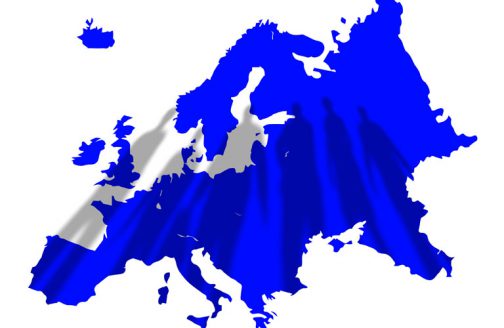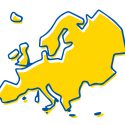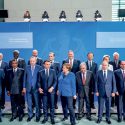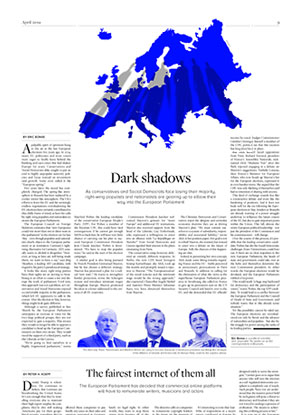As conservatives and Social Democrats face losing their majority, right-wing populists and nationalists are gearing up to elbow their way into the European Parliament

A palpable spirit of optimism hung in the air at the last European elections five years ago. In 2014, many EU politicians and most voters were eager to finally leave behind the banking and euro crises that had shaken Europe for years. Conservatives and Social Democrats alike sought to put an end to highly unpopular austerity policies and focus instead on investment and growth. Some even called it the “European spring.”
Five years later, the mood has completely changed. The spring-like atmosphere in Brussels has been replaced by a cooler, winter-like atmosphere. The UK’s efforts to leave the EU and the seemingly endless negotiations overshadowing the EU elections have certainly contributed to this chilly frame of mind, as have the calls by right-wing populists and nationalists to storm the European Parliament.
The European Council on Foreign Relations estimates that “anti-Europeans could win more than one in three seats in the parliament” in the election set for late May – even though populists and nationalists clearly object to the European parliament as an institution. Germany’s rightwing Alternative for Germany (AfD) actually wants to abolish it altogether. “However, as long as laws are still being made there, we want to have a say,” says Jorg Meuthen, a leading AfD candidate, with regard to his party’s paradoxical strategy.
It looks like many right-wing parties have their sights set on moving to Strasbourg in an effort to cause a stir and disrupt the work of parliament. Until now, this approach was not a problem, as Conservatives and Social Democrats enjoyed a comfortable majority in the parliament, which left EU opponents to sulk in the corner. After the election in May, however, things might look quite different.
Although a survey published in late March by the European Parliament anticipates an increase in votes for the two large political groups, they are not expected to gain a majority. This means they would no longer be able to appoint a candidate to head up the European Commission on their own steam. They would need the support of a third party, such as the Liberals or the Greens.
“We’re going to find ourselves in a highly fragmented parliament,” warns Manfred Weber, the leading candidate of the conservative European People’s Party (EPP). For Weber, a member of the Bavarian CSU, this could have fatal consequences. If he cannot get enough MEPs to back him, he will have very little chance of carrying out his plan to succeed European Commission President Jean-Claude Juncker. Weber is determined: “We have to stop the populist wave,” he said at the start of his election campaign.
A similar goal is also being pursued by French President Emmanuel Macron, but he has chosen a different strategy. Macron has presented a plan for a radical “new start.” He wants to strengthen border protection, revise the Schengen system and introduce minimum wages throughout Europe. Macron promoted his ideas in a letter addressed to the citizens of all EU countries.
Commission President Juncker welcomed Macron’s gesture for “more Europe” and additional EU institutions. Macron also received support from the head of the Liberals, Guy Verhofstadt, who expressed a willingness to enter into an alliance with “La Republique en Marche!” Even Social Democrats and Greens signaled their interest in the plans emanating from Paris.
The conservative camp, however, delivered an entirely different response. In Berlin, the new CDU-head Annegret Kramp-Karrenbauer, aka AKK, took up the mantle and promptly issued a rejection to Macron. “The ‘Europeanization’ of the social systems and the minimum wage would be the wrong approach,” she countered. Chancellor Angela Merkel and Austria’s Prime Minister Sebastian Kurz, too, have distanced themselves from Macron.
The Christian Democrats and Conservatives reject the dirigiste and centralist economic doctrine they see as driving Macron’s plan. “We must commit ourselves to a system of subsidiarity, responsibility and associated liability,” wrote AKK in her position paper. Her goal is not to rebuff Macron, she insisted, but instead to enter into a debate on the future of Europe. Still, the chances of this happening are slim.
Indeed, in presenting her own concept, AKK made some biting remarks regarding France and the EU – barbs perceived as unnecessary provocations in Paris and Brussels. In addition to calling for the elimination of what she views as the superfluous European Parliament presence in Strasbourg, she called on France to give up its permanent seat on the UN Security Council and hand it over to the EU, and she demanded that EU officials’ income be taxed. Budget Commissioner Gunther Oettinger, himself a member of the CDU, pointed out that this taxation has long since been in place.
But AKK herself faced opposition from Paris. Richard Ferrand, president of France’s Assemblee Nationale, nicknamed AKK “Madame Non” after she flatly rejected engaging in a debate on Macron’s suggestions. Nathalie Loiseau, then France’s Minister for European Affairs, who now heads up Macron’s list for the European elections, expressed it in even harsher terms. She argued that the CDU was only thinking of themselves and had no intention of sharing with anyone.
This kind of exchange sounds less like a constructive debate and more like the hardening of positions. And it does not bode well for the era following the European elections in May. Insiders in Brussels are already warning of a power struggle underway to influence the future course of the EU, but also to gain important posts within the Union. This fall, almost the entire European political leadership – not just the president of the Commission and his commissioners – will change.
Over the course of this process, it’s possible that the leading conservative candidate, Weber, but also his Social Democratic challenger, Frans Timmermans, could lose out. If there are no clear majorities in the new European Parliament, the heads of state and government could take over at the helm and themselves determine the next Commission president. In other words, the European elections would be devalued, and the European Parliament robbed of its power.
This would mark “a huge step backward for democracy and the participation of voters,” warns Weber, the top EPP candidate. “It would lead to a conflict between the European Parliament and the Council of Heads of State and Government, and nobody wants that in this already tense situation.”
Yet this possibility cannot be ruled out. The European elections are overshadowed not only by Brexit and the advance of nationalists and populists – but also by the struggle for power among the ranks of its leading parties.
Eric Bonse
is a political scientist and journalist. He works as an EU correspondent in Brussels.




